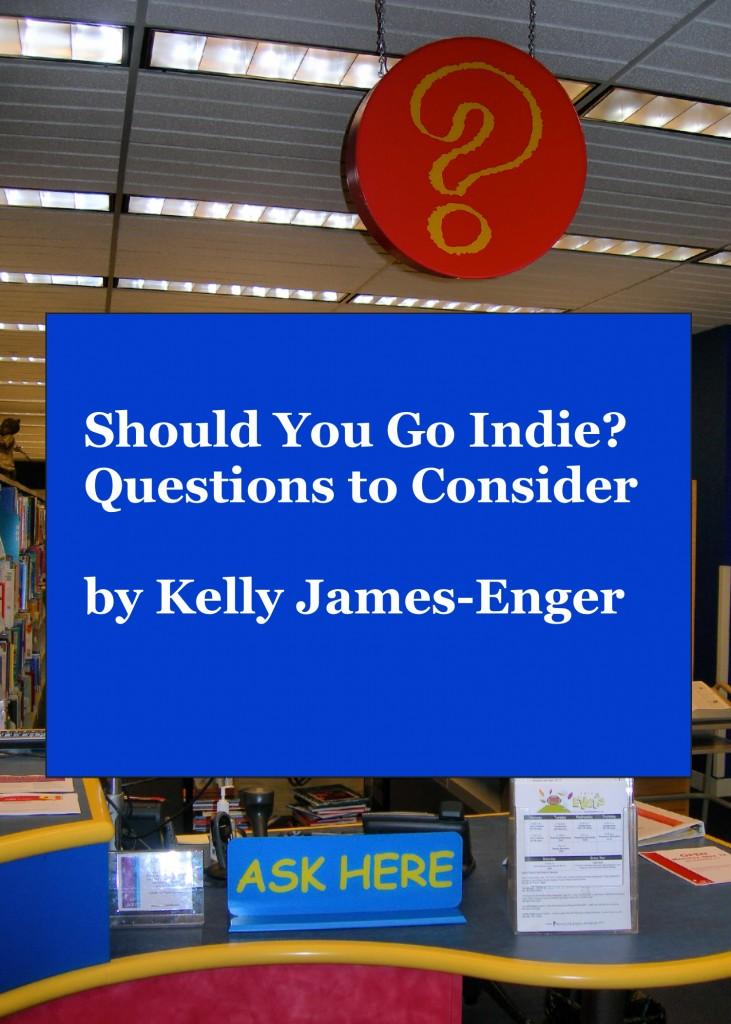Should You Go #Indie? Questions to Consider By Kelly James-Enger
Dear Writers,
Many of you have started your National Novel Writing Month projects! Congrats and good luck!
This month and next, as I hunker down to write my novel, I’ve organized a series of wonderful guest posts on indie publishing. I’ve invited writers and publishing professionals to help you learn. Today, I welcome the amazing Kelly James-Enger who reflects on the question, Should You Go Indie?
Happy Writing! Rochelle, the Write Now! Coach
Technology has changed the publishing landscape, giving would-be authors more opportunities than before. You needn’t pursue a traditional publisher; now you can use a print-on-demand, or POD, company to get your book in print, or choose a third option—starting your own indie publishing company.
But before you do so, it’s smart to ask yourself some critical questions, like the following:
How much experience do you have? The more you know about publishing, the better. I’d published books with both traditional and print-on-demand publishers before I even considered launching my own press. And yet the learning curve was still steep when I founded Improvise Press last year; I spent about six months lining up everything I needed to turn two finished manuscripts into actual books.
How will you connect with your audience? A traditional publisher may not do a lot to market your book, but it has an easier time getting it into the bookstore. When you have your own press, you need to act as your own distributor, or hire a distributor. The former is time-consuming; the latter is expensive. If you connect with your readers directly—for example, you have a strong social media presence—you’ll have an easier time as an indie publisher.
How much time are you willing to commit? Trust me, everything will take longer than you expected, or planned. First you write the book. Then you must edit and proofread it, or hire someone to do that for you. You’ll also need a cover designer; an interior layout designer; and someone to write the cover copy on the book cover or jacket itself. And that’s just the beginning. You still have to have distribute, market, promote, and sell the book—or hire someone else to do it.
How much marketing experience do you have? Any author will tell you that writing the book is the easy part; actually selling the book is the most time-consuming part. If you’ve marketed other books before, it’s a huge help as an indie publisher. Otherwise you can plan to spend money hiring someone to market your book for you.
How much money are you willing to spend? You can launch an indie company on a shoestring, but most people spend more than that. I spent about $4000 (including 100 copies of each of the press’ first two titles so I had them available to sell) to launch Improvise Press; I’m still operating in the red. Would I do it again? Ask me in a year or so when I hope to be turning a profit.
How realistic are your expectations? I planned to sell at least 2,000 copies of my IP titles in the first quarter; actual sales were just over a tenth of that. Since then, I’ve been selling 30-40 copies (including electronic versions) of IP titles each month. I average about $5/copy (that includes print and electronic editions), so when you do the math, you can see that it will take time to make that money back. If you think going indie ensures thousands of sales, you may want to check your thinking.
How committed are you? Starting an indie press takes time, and when your profit per-book is only a few dollars, it also takes time to make a profit. If you decide to go indie, plan to commit time every week to continuing to promote your books and your company—and you have to be willing to do that for the long haul.
There are no right or wrong answers to these questions; some book authors thrive as indie press owners and others prefer to stay traditional or POD (or a mix of both). Being honest about your expectations and your abilities will help you make the right choice that best fits you, and your books.
Your turn: What’s your experience with going indie?
 About the author. Kelly James-Enger is the owner of Improvise Press; she’s also the author of books including Goodbye Byline, Hello Big Bucks: Make Money Ghostwriting Books, Articles, Blogs and More, Second Edition. She blogs about making more money in less time at http://dollarsanddeadlines.blogspot.com.
About the author. Kelly James-Enger is the owner of Improvise Press; she’s also the author of books including Goodbye Byline, Hello Big Bucks: Make Money Ghostwriting Books, Articles, Blogs and More, Second Edition. She blogs about making more money in less time at http://dollarsanddeadlines.blogspot.com.










Vital considerations that are missing have to do with whether you are interested in publishing one book or many. Developing the experience and the infrastructure will take a great deal of time and resources. To do that for one book only is madness. A publishing company makes money by specializing in a genre or two and then benefiting by economies of scale.
Also, you must ask yourself, “Do you want to run a business and learn 10 jobs that, in a larger publisher, separate people would have? Are you able to do that while holding another job?